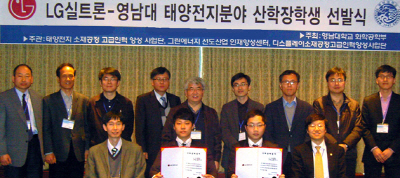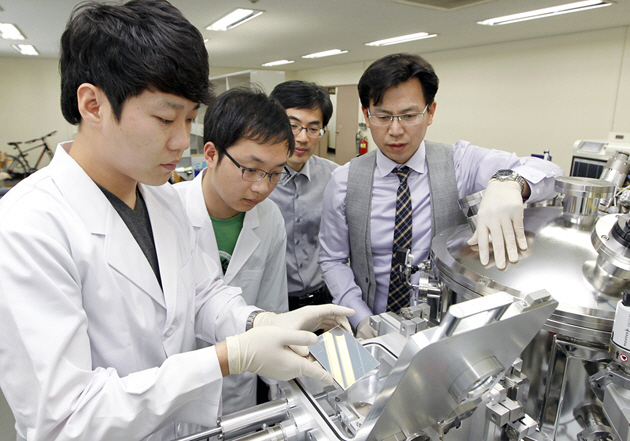YU receives attention from LG Siltron and LG Innotek
Operating industry-academic scholarship programs linked to employment to procure high-quality human resources in the solar cell sector in advance
[May 1, 2012]

2 graduate students of the YU School of Chemical Engineering selected as industry-academic scholarship students of LG Siltron, advising professor, and people from participating companies
(Front row, left to right: Kong, Soon-hyun of LG Siltron,
Jung, Ho-seob, Jung, Seong-woo, Jung, Jae-hak (professor))
For the past several years, Yeungnam University (president Lee, Hyo-soo) has been receiving calls from companies in the solar cell sector. Companies are keeping an eye on YU to procure high-quality human resources in the solar cell sector who completed education and research programs in the green energy sector, such as the Green Energy Education & Research Center, Solar Cell Materials and Process R&D Advanced Track, and the Major of Green Energy.
Jung, Seong-woo (26, 2nd term in master's degree program, advising professor Ahn, Kwang-Soon) and Jung, Ho-seob (28, 3rd term in master's degree program, advising professor Kim, Woo-kyoung), who are enrolled in the YU Graduate School of Chemical Engineering were recently selected as an industry-academic scholarship student for LG Siltron. They will receive full scholarships for graduate school and also land a job immediately after graduating.
What is in common between the two is that they are both completing the Solar Cell Materials and Process R&D Advanced Track (hereinafter called 'Advanced Track') that has been offered by the YU Center for Solar Cell Materials and Process R&D Workforce Cultivation Program. This Advanced Track, in which a total sum of 3.55 billion won, including 2.3 billion won in national funding will be invested in until 2015 with the goal of fostering high-quality human resources customized to the solar cell sector, is an industry-academic collaboration education and research course operated by 14 professors in the YU School of Chemical Engineering and Department of Physics, as well as 20 companies including LG Innotek, LG Siltron, STX Solar, OCI Materials, and Bexel.

Currently, 52 undergraduate and graduate school students are taking this track. Through concrete and clear goals, such as offering employment-linked education via special agreements between the university and companies, making it mandatory to select degree theses topics for corporate projects, visible achievements are being made in a short period of time. For one example, 3 students who completed their undergraduate education and completed the Advanced Track have already landed a job with LG Siltron, and Jung, Seong-woo and Jung, Sung-ho, who are selected as industry-academic scholarship students, have also confirmed employment as a researcher in the company's R&D center as soon as they complete their graduate school program.
Earlier in February of last year, Kim, Woo-nam (27), Kim, Sung-cheol (27), and Lee, Jung-eun (24), who were in the second term of their master's degree program at the YU Graduate School of Chemical Engineering, and Park, Joon-seong (27), who was in his first term of his master's degree program, were also selected as industry-academic scholarship students of LG Innotek, and have thus received scholarship and were guaranteed employment after their graduation.
LG Siltron and LG Innotek, who have procured the green talents of YU on the best conditions, are the two major electronic parts subsidiary companies of the LG Group. In particular, LG Siltron is a manufacturer that specializes in wafers to be used in semiconductors, which are core parts for solar cells, and achieved sales of 1.1027 trillion won and operating profits of 147 billion won based on the international financial reporting standards (IFRS) last year. It is currently producing polished water, EPI wafer (Epitaxial wafer), and solar substrates. It is also accelerating growth through the enhancement of production yields and extending the 300mm wafer plant, and is showing rapid progress in the solar cell materials process sector as well. LG Innotek recorded sales of 4.1035 trillion won and 156.5 billion won in operating profits based on the IFRS last year. Recently, it has constructed a pilot line for the development and mass production of CIGS (copper, indium, gallium, selenium) thin film solar cells, and is aggressively investing solar cell R&D to develop into a global electronic parts company.
In addition, the 'Major of Green Energy', which received its first batch of new students in 2010, also signed the special employment-linked agreements with LG subsidiaries such as LG Electronics, LG Display and LG Siltron, thus ensuring their employment if the graduating students desire employment there.
On such love calls of conglomerates for green talents of YU, Professor Jung, Jae-hak (50, School of Chemical Engineering), the director of the YU Center for Solar Cell Materials and Process R&D Workforce Cultivation Program, stated, "Despite recent issues of students avoiding to enroll in graduate schools due to the difficulties of finding employment for highly educated persons, six graduate students received not only scholarships, but guarantees for employment. This makes us very happy." He also added, "This is the result of YU becoming renown nationwide by concentrating on education and research in green energy, and particularly solar cells."
The company officials said, "Students who received industry-customized education in the solar cell sector at YU have sufficient expertise and outstanding adaptability so that they could be utilized on site as soon as they graduate. Another strength is that they have a special sense of mission on green energy development and research for solar cells."
Meanwhile, YU won national projects in the green energy sector such as 'Center for Solar Cell Materials and Process R&D Workforce Cultivation Program' that fosters master's and PhDs in the solar cell materials processing field, 'Daegyeong Economic Belt Green Energy Education & Research Center' (Ministry of Education, Science and Technology), and 'Daegyeong Regional Innovation Center for Solar Cell&Module' (Ministry of Knowledge Economy). Through these projects, it has concentrated efforts on fostering expert personnel and R&D, and recently, it was also selected for LINC project (technology innovation type) to establish its position as a regional hub university.











